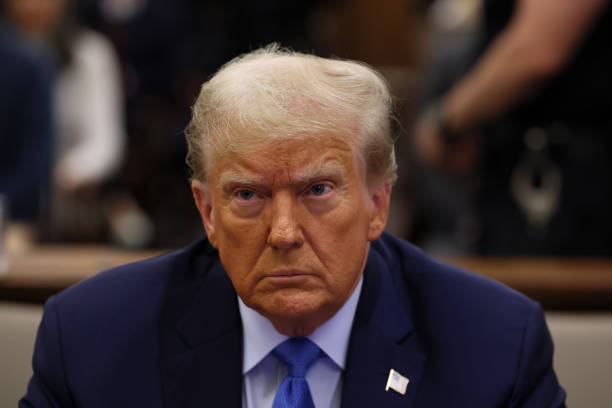In a recent NBC News interview, former President Donald Trump suggested his potential bid for a 3rd term in office, stating that he was not joking about it. While he acknowledged the complexity of the scenario, he hinted at various methods available for achieving this goal, referring to ideas shared by confidants like Steve Bannon. Bannon confirmed that he believes Trump could run again in 2028, emphasizing a belief in an organized effort behind Trump’s return.
22nd Amendment does not allow for 3rd Term
A controversial proposal from Republican Congressman Andy Ogle seeks to amend the 22nd Amendment, which limits presidents to two terms, allowing Trump another chance at office. This has prompted a strong response from Democrats, particularly Congressman Daniel Goldman, who highlighted the unconstitutionality of such measures and warned of the dangers posed by Trump’s rhetoric. The conversation reveals a broader strategy from Trump’s camp to normalize audacious political ideas over time, aiming to diminish public shock and resistance against them. Analysts express concern that these discussions distract from pressing issues like economic decline, which could affect public sentiment towards Trump.
Highlights
- 🗳️ Trump Suggests 3rd Term: In an NBC interview, Trump implied he could run for a 3rd term, emphasizing he was serious about the possibility.
- 🗣️ Support from Steve Bannon: Bannon reinforced Trump’s claim, expressing confidence in Trump’s chances for a 2028 run and the organized efforts behind it.
- 📜 Constitutional Amendment Proposal: Congressman Andy Ogle introduced a resolution to amend the 22nd Amendment, allowing Trump to seek a 3rd term, igniting controversy over its legality.
- ⚖️ Unconstitutionality of Amendments: Critics, including Democrats, argue that amending the Constitution to favor Trump is unconstitutional and unlikely to pass. A 3rd term is unlikely.
- 🧠 Normalization of Authoritarian Ideas: Trump’s remarks are seen as an effort to normalize controversial ideas about leadership longevity and undermine democratic norms.
- 📉 Economic Context: Current economic challenges are cited as potential worries for Trump, serving as background noise amidst his bold political claims. Especially 3rd term claims.
- 🇺🇸 Calls to Action: Analysts urge vigilance among voters and the public to counter Trump’s rhetoric, framing resistance as a patriotic act rather than radicalism.
Key Insights
- 🔍 Public Sentiment and Political Strategy: Trump’s suggestion he might run for a 3rd term is more than a casual remark; it’s part of a strategic narrative meant to influence public perception and explore political possibilities that were once considered out of reach. His commitment to the idea emphasizes a carefully planned long-term political vision, aimed at reshaping the electoral landscape.
- 🏛️ Legislative Maneuvering: The introduction of an amendment to the 22nd Amendment indicates a significant shift in the Republican party’s strategy. By proposing radical changes to long-standing norms, they might be testing the waters to see how much flexibility there is in public support for altering constitutional limits. This suggests a calculated risk to gauge the readiness of the electorate for such drastic steps.
- 📈 Backing from Key Influencers: Support from figures like Steve Bannon not only legitimizes Trump’s aspirations but also aligns with a broader faction within the GOP that is keen on pushing the boundaries of traditional governance. This connection is critical for mobilizing resources and supporters in Trump’s favor, blurring lines between radical ideation and mainstream acceptance within the party.
- ⚡ Media as a Political Tool: Trump’s media presence and statements play a vital role in shaping his narrative. By framing suggestions of a 3rd term as casual or offhand, he can set the stage for future discussions without immediate backlash, allowing the idea to marinate in public discourse. This strategy exemplifies how rhetoric can precede policy changes and lay the groundwork for acceptance among party members and voters.
- 🔄 Responding to Economic Pressures: The potential for economic instability serves as a backdrop for Trump’s assertions. Analysts believe that while Trump engages in bold claims, real economic concerns—like declining consumer sentiment and market corrections—can provide a counter-narrative. This duality underscores the precariousness of political fortunes reliant on perceptions of administrative effectiveness.
- 🌪️ Distraction Tactics: A notable insight from the commentary includes how Trump’s provocative statements function as distraction tactics. Shifting public focus from pressing issues allows for the continuation of his political agenda, suggesting a calculated approach to governance that prioritizes maintaining attention on himself rather than addressing broader national concerns.
- ❗ Engagement and Resistance: The dialogue surrounding Trump’s comments calls for active engagement from the electorate. Identifying such rhetoric as a genuine threat to democratic principles frames opposition against Trump not as radicalism, but as necessary patriotism, reinforcing the importance of civic responsibility and vigilance in current political landscapes. This perspective emphasizes that criticism or dissent is fundamental to preserving democratic integrity.
Overall, Trump’s recent comments concerning a 3rd term bring to light deep-rooted issues related to party loyalty, constitutional boundaries, and the evolving nature of American political discourse. The engagement of party leaders and their strategies illustrate a significant shift in potential governance approaches, merit close examination in terms of implications for the future political climate in the United States.



